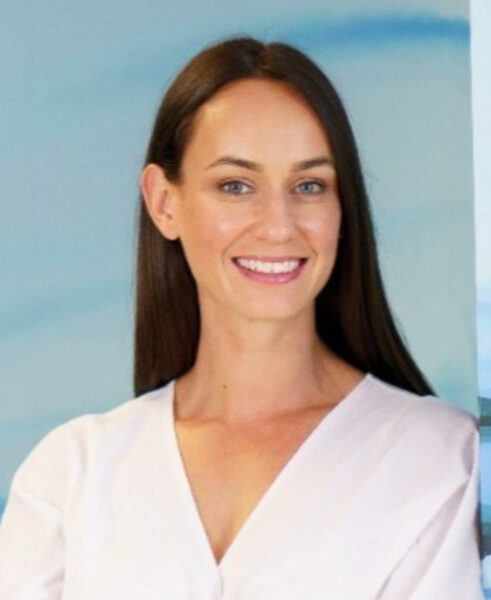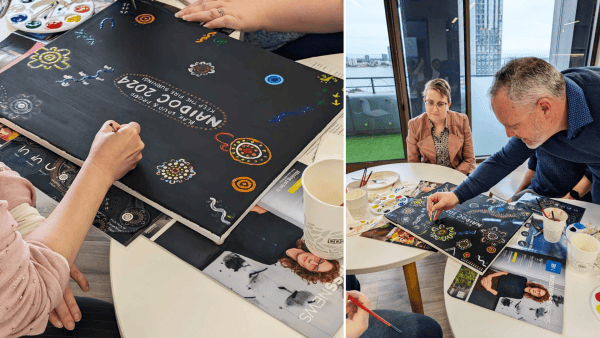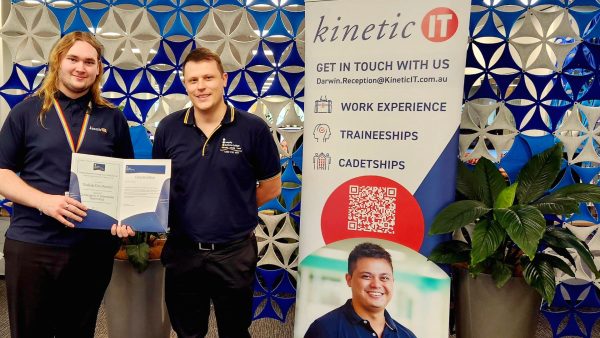To celebrate International Women’s Day, Kinetic IT is celebrating the social, cultural, economic, and political contributions of women both within the ICT industry and beyond.
This is the Sure to Rise podcast, providing a platform for a range of voices from Kinetic IT. The podcast will focus on this year’s International Women’s Day theme, Embrace Equity. Each episode aims to provide tangible insights and actions for women and allies to leverage and continue to build upon the great work done so far in the equity and diversity space.
Watch the full episode or access the transcript below.
Episode 4: Equity for working parents
Perth’s Tara Gindein and Inez Olecki are relatively new parents, with Tara back into the workforce and Inez having just started parental leave. What does equity mean for working parents? How can we better support, in particular, working mums when they are entering a new era of raising children? And what can we do to make the return to work after parental leave an easy and affirming experience? Tara and Inez share their personal experiences as new mums and explore what has helped them – or in Inez’s case, what she reckons will help when she returns next year! Transcript edited for clarity.
Jess Etheridge: Welcome to episode 4 of the Sure to Rise podcast where we’ll be looking at what equity for working parents means. Did you know that as at June 2022, there were 7.3 million families in Australia? Whether you’re a couple parenting or a solo parent, these folks represent a large chunk of our communities – so have we cracked the nut that is equity for working parents? Well, it depends. To help me explore this topic, I’ve invited two Kinetic IT crew and relatively new mums to join me – welcome to both of you, introduce yourselves and let us know a bit about you!
Tara Gindein: Hi. Yes, my name’s Tara. I am the senior manager of the corporate brand and marketing team here at Kinetic IT. I’ve been working with Kinetic IT, it’ll be eight years in June. And yes, I returned to work when my daughter was nine months old, and my partner took three months of parental leave. And here we are today. Yeah.
Inez Olecki: Hi I’m Inez, I’m a senior service desk technician at Kinetic IT. I’ve been with KIT for just over one and a half years, and I started in the service desk role, and now I’m in the end user support team where we go and support the users out in the field. And I’ve just started maternity leave. My daughter’s nearly three months old and I hope to come back to work once she turns one. So next year.
Jess: Thank you so much for joining me today, ladies. Inez, as you just said, your journey has just started. How’s it going?
Inez: Pretty, pretty epic. I think probably the best thing for me is I have an extremely supportive partner who’s very involved. He’ll be like, I’ll do the nappy changes, like it’s made this whole process transition so much easier. We don’t have as much friends and family close to us, so we rely on each other. But yeah, that’s, that’s been he’s been my rock.
RELATED CONTENT: Sure to Rise / Episode 1: Celebrating First Nations women and addressing the gender pay gap
Jess: That’s wonderful. Both of you have touched on like having partners who are men, who are doing their share of raising children. Tara, it was really interesting what you shared about what your husband did in terms of taking parental leave. How has that kind of worked out? And what’s your reflections on that?
Tara: Yeah, look, I was really keen for Pete, my partner, to take the opportunity to spend some time one on one with our daughter, Genevieve, and, yeah, leverage the parental leave scheme that his workplace had in place for him. We just felt it was really important for him to experience, you know, that whole side of parenting to give me the opportunity to return to work at the nine month period as well. I’m not going to lie. When it came to the day of returning to work. Well, actually it was a Sunday and I’ll starting on a Monday. I was crying, I was doubting myself, you know, I was so, you know, at the six month mark. Yeah. I can’t wait. And then nine months and the day rolled around and I was just so upset and I felt I had such an a range of emotions. I felt a lot of guilt of leaving my daughter. And nine months, they’re still so young. And in fact she’s still so young, you know, 18 months, 17 months now. But then once we you know, once I enter back into the workplace, you know, after day one and sort of started to get back to that swing of things and my partner started to settle into that role of being the primary carer, it felt right. And it really it exposed him and gave him the experience to understand what it is like to be a full time primary carer at home with the baby, the immense pressure and emotions and experience and everything that comes with that. But as well also to, you know, just have that one on one time and really bond with Genevieve, which has just created a really beautiful relationship that they have now. But it also, I think has played a really big part in how hands on he is like So, you know, he got to see the other side. And so it really has helped us to have quite a as balanced as possible partnership and co-parenting approach. So yeah, it’s been I really am grateful for that.
Jess: Inez, does Tara’s experience resonate with you in terms of like modern co-parenting and kind of society’s changing attitudes to parenting?
Inez: Yeah, it definitely does. And my partner is from originally from India, so there’s a very traditional set of, you know, the mum stays at home for 40 days, she’s the primary caregiver. So we’re doing things a lot differently to what he was raised with. And even what I was raised with. Dad would go to work and, you know, that was kind of how it played out. So, yeah, I think we’ve even been discussing doing something like that, what Tara’s done. Just seeing how our daughter goes and then maybe consider looking into that. Otherwise I’ll be back in the following year.
Tara: I think just on that, I would love to have done a year, but then for Pete to still have done three months or another time, so I think like the structure and flexibility around parental leave schemes needs to be a bit more what you call it, contemporary. It needs to be a bit more open to the actual realities of raising children when you’re confined to that one year period that like one year is both a huge amount of time and not enough time at all. And, you know, so it would have I would have loved to have done that full solid year and then still have the flexibility and ability for Pete to take time off in a parental leave arrangement to care for Genevieve. So yeah, that’s I think that’s something that would be a, you know, a good future idea for workplaces.
Jess: Going back to what you were saying, Tara, about that night before, almost like night before first day of school again, returning to work. How did you get through that? Because that can be really overwhelming sometimes and for people who are new parents, it’s all foreign. And it’s like, as you say, having that time is time. You don’t get back, you know. So how did you manage or see yourself through that?
Tara: Well, like I said, I cried a lot. Pete was actually out at a baby and toddler first aid course which I can highly recommend that every parent does either before or soon after their child is born, it’s so invaluable. I had already done mine and he got invited to do one with another group of friends. So he went off and did that. And I remember the day it was actually quite a rainy day, which just felt like it matched my feelings and I just I felt on edge all day, I felt this sort of like slight impending doom. I had this nervous sort of feeling and this guilt and thought that she wasn’t going to feel as close to me like we’d be breaking a bond and I know this sounds crazy, like it sounds like, you know, completely irrational. But yeah, it was just a really challenging time. And also so when Pete got back, we were going to go out and meet some friends for lunch who also have a daughter who’s about 5 months older than Genevieve is, and as we got to the car park I just burst out crying and Pete was like what’s going on? I’m like, I just feel so sad. I feel so sad that my time, my official time off has come to a like, you know, So it’s a huge milestone. I can almost get teary now. And we just talked through it, and you know, tried to I suppose, you know, talk through the problems that I felt were, you know, that were there or that, you know, just the emotions really, less problems. Coming into the workplace, you know, back to work, you know, it’s really nice to see everyone and say the team and everyone was so welcoming. So that obviously helped a lot. I did warn everyone that I was on the verge of tears continuously and I couldn’t talk about it for the first half of the day because I was just going to cry. And again, I feel like it’s really irrational, but you are super emotional about that sort of stuff. But then, I don’t know, I suppose I just it was like a continued learning curve of adjusting. And I think that’s the biggest thing is returning to work as a mum, a new mum in particular. It is just continuous adjustments here and there, give and take. You know, get too far and something, pull yourself back, reset boundaries, don’t try to put too much pressure on yourself. Yeah. And the other thing I suppose is I was really grateful at least that Genevieve was being cared for by Pete, by her father. And that’s in no disrespect of like day-care or anything, because I know that that’s the only option for a lot of people. But, like, it just helped me feel more confident and comfortable. And I had to just keep revisiting the reasons why we chose for Pete to do the three months. So those are the key things that I did, my coping mechanisms.
RELATED CONTENT: Sure to Rise / Episode 2: Capability versus availability
Jess: Yeah. [Inez’s baby cries out in the background] Just checking, Inez, if you need a go at all…
Inez: Yeah. I was like, can you hear her? I’m just going to quickly check on my partner, I’ll be a sec… [Inez goes to check] Yeah, I thought so. Feeding time. Luckily, in a way, it’s mix feed so at least he can take care of her. But I tried to time the feed. I was like, okay, a quickly feed her before we start. And then she should be good. But of course not.
Tara: Actually, that’s one thing as well. It’s like you can make as many plans and even if we make them in your head, I don’t know how it’s like they’ve got some weird, like a way of like tapping into your head and. Yeah they do! Your thoughts, they all- any plans that you want to make. So yeah, it’s funny.
Jess: It’s interesting because one of the stats that I found while researching for this episode comes from the
Workplace Gender Equality Index, or WGEA as a lot of people refer to it. And the latest stats show that women comprise 47.9% of all employed people in Australia, that 27% full time and 20, well, not much lower, but 22% are working part time. And as you say, you can’t tell bubs when feeding time is and how you respond to them. So, do you have reflections, perhaps Tara coming back to you as you’re back into the workforce already, what do you do to manage that sort of stuff, that life stuff?
Tara: Communication. The big one. That’s the most important part, communication with your partner is really, really critical. Parenting and motherhood and having a child and everything is so, so beautiful. It’s such an amazing experience and you love it, but it’s also like it creates- it’s like just another, you know… it’s exhausting. It can trigger bigger emotions that are that are warranted, you know, even like. You can’t underestimate even like the physical changes that happen in women. When they have children, the hormonal changes that happen both growing the baby and then after the baby, like all of that plays a really big part, you know, So the the sort of communicating with your partner all the time, communicating with work, if there are challenges that arise that home. Communicating with your team, you know, and explaining to people because I don’t there’s never a time where someone and again, I don’t mean this in any disrespect, but when someone who doesn’t have a child, they will never fully grasp what it, what it is and what it means and what the impact is, and that’s fine. I had zero idea. I thought I had no idea, zero idea what it actually is really like, once I became a parent [I did]. But that’s and that’s totally fine. That is how it is. And you know, before when you’re pregnant, you know, before you have a child, people who have a family and who have children saying ‘nothing can prepare you for parenthood or having a child’. And it it’s honestly true. You can have assumptions. You can you can have ideas and try and plan as much as you want, but it just doesn’t fall into place like that. There’s just too many variables, too many situations that can arise. So It’s about I don’t know. I’m working on this all the time because it’s not a natural trait in my personality, but I keep getting advice from certain key people in my life that I need to let go a little. I need to like, give in to some things. I need to not put so much pressure on myself, perhaps not put so, so much pressure or have expectations of others, you know? Yeah, you know, not to lower them, but just to accept the realities and not fight things so much. Because I do have that sort of I tend to be along the lines of highly ambitious and perfectionism and all of those toxic traits, you know, like there’s so much there’s so much that you can’t control. So, for me, I’m continuously working at what I can control and giving in to the things that I can’t. And then just sort of flexing and going with the flow of whatever sort of happens.
Jess: Nice, thank you for sharing that. Inez, Tara touched on some things that I saw some big nods from you on, you know, how are you finding it and did some of that resonate in terms of some of the emotions around kind of this ‘new normal’? And yeah, what if you and your partner have been talking about in this new phase?
Inez: Yeah, 100%. The communication part, like I remember the first night we had her at home and it’s all, Yeah, like you were saying, Tara, you can read all the things and get all the advice, but you got no idea what you’re doing. And it’s so scary. The main thing we did was talk through all our emotions because we would go from like completely petrified to angry because we didn’t know what we’re doing or she’d start crying and just we’d actually talk about it. And especially if we had emotions towards each other because everything’s just all muddled up, we would just say, You know, what you did just really made me angry, or what you did really stressed me out, and we just made sure we kept communicating like that for that first epic couple of days. And that seemed to really help us.And even now, like, obviously we’re going to start getting into a difficult sleep phase. We’re going to get less sleep. We just really make a point to make sure we communicate to each other and put our hand up and say, I’m not I’m not coping. I need to take a walk or whatever it might be.
Jess: With what you know, Inez, about what you do in terms of your job and what you might expect to come back to. But now knowing what you know now, what do you think equity is going to look like to you? What do you think’s going to work for you in terms of the workplace support around supporting you?
Inez: I think it’s just recognising that I’m in a different space and I have different sort of lifestyle needs. My job sometimes will involve traveling, usually, you know, to the southwest, but it could be up north. And um, you know, initially when I got the role just before I announced I was pregnant, I think it was they said, you know, is it is it fine to travel? And I thought in my head, yeah, it would be great. I can have a break, you know, that sort of stuff. But it’s a lot different now that she’s here. So I think it’s just making sure I can talk through those options and, you know, work through that. But I mean, my two managers have been extremely supportive during the pregnancy, so I have no concerns. And that the main reason was they were checking on me and we had again, it’s all about the communication. Um, like Tara said, one of my managers isn’t a parent, one is so one could kind of understand, gave me advice, but we’re going to be in different things or different places, I should say. Parenting is different for everyone, but it’s about making sure that, yeah, you give your employees, especially women, that opportunity to say, Hey, this isn’t working for me, okay, can we work through some other process, especially when it comes to a job where it might be travel or might need more upskilling, anything like that.
RELATED CONTENT: Sure to Rise / Episode 3: Being an intersectional ally
Jess: Maybe coming to you, Inez, first, what’s something that you intend to plan for when you return to work? What’s something that you’re going to be talking to or communicating with your team to? Since communication’s a big theme that’s come through this chat?
Inez: Oh, good question. Well, it’s actually going to like meeting my team leader and my manager before I’m at work and actually working through, Hey, I’m keen to come back in a month or whatever it might be, especially if I do decide to come back earlier and actually kind of giving them a heads up. So then we have that opportunity to talk about what my role is going to look like if I guess I’ll go part time or maybe I’ll go full time, like deciding or working through what’s going to work for KIT, for the contract, and especially for me, rather than rocking up and going, okay, this is what I want to do. We’ve going to be fair and we’re talking about equity, right? We want to be like, make sure everything’s fair to both KIT and to myself by making sure you have that communication open. So I am very confident I’ll go back and I even spoke to the guys before I left, you know, that they were so keen to have me back and to make sure, yeah, we work through whatever ideas I’ve got to whatever will work for me.
Jess: That’s wonderful. And flipping it slightly, Tara, and it might be a bit tricky, but is there anything you would have done differently when coming back to work?
Tara: Differently? I don’t think so. So I work three days a week and I also had lots of check ins with my manager leading up to the time. Just, you know, he would call up and just see how I was going and he involved me like when there were like bigger sort of conversations or decisions that were being made that affected my team and potentially my role or whatever.
Tara: So that was really great. Just to be kept in the loop in that sense. Yeah, we talked about sort of what my role would look like and what it would mean. I suppose one thing that I said to myself was like I would set barriers and boundaries. I had to honour my decision to work part time and be there for Genevieve and not let work bleed out and into that time. Because it’s not it’s not just fun playtime all the time. Like, don’t get me wrong, it’s beautiful and we have a lot of fun time when I’m caring for her, but it is a full time role. Being a carer – whether you are at a park playing or you’re cooking or you’re trying to clean and do something else, whatever – it’s a full time job, you know, when you’re not working in the office. And then also having time to study and do my work and I need to do that. So just as far as just making sure I was managing my time and my availability, if that is also, again, something that’s not a continuous battle of myself of. You know, I don’t have anyone putting extra pressure on me in that sense. Work has been fantastic. My manager’s really, really supportive and, you know, really has a flexible mindset, my team is amazing. They’re so supportive. So everything, it’s all just been fantastic. I feel incredibly grateful for… the job and for the company that I work for, for KIT. Because I know that not everyone gets this experience. I know personally some friends of mine who have, you know, full time jobs, but of course legally, like the job gets held for them, etc., but they get told that it’s a full time role, you know, not a job sharing role, not a part time role, etc.. So they had to find new jobs, which is honestly really disappointing because it focuses more on the job and the structure and systems that are, you know, status quo and legacy. And it doesn’t really adjust for, you know, modern of ways of working and for the needs of the actual employees that they should be valuing. So yeah, I feel incredibly grateful and lucky for the circumstances that I’ve found myself in. And so, yeah, it’s been great. But yeah, I don’t think I would have changed anything. It’s been a really, really great return to work for me.
Jess: That’s awesome to hear because yeah, I think people often are quite down on themselves, ‘could’ve, should’ve, would’ve’, and I think at the end of the day, as long as in your heart and you feel you’ve done the right thing, that’s the main thing. Yeah. It’s just great to hear a woman and a mum saying that they are proud of how they did it, because I think that can encourage a lot of people to, to do, to be brave and back themselves and that sense.
Tara: Yeah, absolutely.
Inez: And if I can add to that, one of the things that I did was I actually spoke to women in KIT before I went on maternity leave to ask them how it’s going because I was so anxious. I was like, I really wanted to keep going with my IT career. I wanted to sort of get feedback from other mums how they’ve managed things. So speaking to women within the company, knowing that they had that support, working through those feelings of anxiety or whatever it might be, it was really, really good.
Tara: Yeah, I remember like, I don’t know if it was my last day or whatever, but I was like, don’t forget about me. Like, you know, love work, I love working, I love my job. And I was like, Oh my God, you know? And I had like, I just felt so.. I was sad to be leaving work, basically for that time and shifting into this new era. And then, of course, once Genevieve arrived, it’s like, ‘love! ahh!’ All these GIFs and emojis that come with that and your entire perspective shifts like, and everything that you.. it makes you just, I suppose, reprioritise and, you know, rethink about what’s important. And it’s a bit of a reality check as well. So, you know, things that would stress me out a lot or that I’d really, you know, jump into and everything. You know, I’m not.. I just take a more relaxed approach to things because at the end of the day, the most important thing is that I’m there, I’m Genevieve’s mother, I’m raising, playing a really important job in raising her, I’m present and bringing my best self to that role, as well as to my job here.
Jess: I think you’ve both offered some really great advice about reaching out to other women or other mums and being present and being kind to yourself as you embark on something that is just so unfamiliar to so many people until you’re into it. And so I just want to thank both of you for your time and joining me today. And that’s episode four of the Sure to Rise podcast. Thanks for watching. We will be taking a little break from the podcast, but we intend to keep this series going. But that’s us in terms of celebrating International Women’s Day for 2023. Thanks for joining us. You can find more on KineticIT.com.au.
About Tara Gindein
Tara Gindein is Kinetic IT’s Senior Manager, Marketing and Communications, and has been with the business for just under 8 years. Based in Perth, Western Australia, she oversees the company’s brand and digital marketing. Tara returned to the workplace at the end of 2022 following parental leave. Find Tara on LinkedIn.
About Inez Olecki
Inez Olecki is a Senior Service Desk Technician at Kinetic IT, having joined the company in 2021. Supporting a key customer in Western Australia, Inez is currently on parental leave, returning to the workforce in early 2024. Find Inez on LinkedIn.















